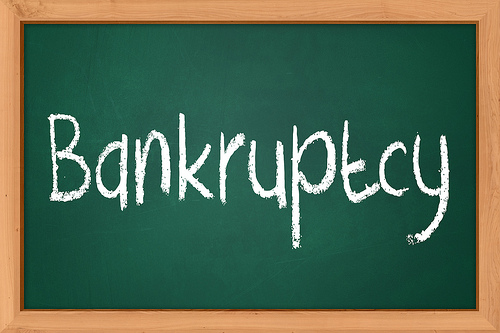Worried about how bankruptcy will affect your credit score? Maybe you have already filed for bankruptcy and are working on rebuilding your credit? Whatever your situation may be, rebuilding a credit score, especially after bankruptcy, can be difficult but not impossible. The following are some facts regarding how bankruptcy affects your credit score, how you can rebuild your credit after bankruptcy, and a few myths about bankruptcy that you should be aware of:
 Filing for Bankruptcy
Filing for Bankruptcy
Here are simple steps to filing for bankruptcy:
- First, you should be aware that filing for bankruptcy is not actually SIMPLE, and sometimes, depending on your situation, there are other options worth considering. Make sure you sit down with an attorney to discuss your options and to talk about filing for bankruptcy before you go about refinancing your house, filing for bankruptcy, etc.
- Determine whether or not you qualify for chapter 7 bankruptcy; this is based on your income compared to other similarly sized families. If not, you can try chapter 13 “debt consolidation.”
- Decide if you are going to file for bankruptcy on your own or if you are going to discuss your situation with a lawyer.
- You will have to pay somewhere between $30-$50 dollars for mandatory credit counseling.
- Complete all the necessary paperwork; this is where help usually comes in handy.

- Next, in order to file a petition with the court you will need to submit all your paperwork along with your credit counseling certificate.
- Attend the meeting of creditors.
- Within 45 days of the creditor’s meeting you will need to complete a post-filing personal financial management course. This usually costs about $30.
- Wait for approval.
- Begin rebuilding credit.
Dealing with Bankruptcy
According to dailyfinance.com “it’s important to realize that there is life after bankruptcy. And it doesn’t have to be a life where you’re treated like a financial outcast and banished to years of credit exile.” As long as you have a good post-bankruptcy plan/budget and you stick to it, then you can look at bankruptcy as a second chance. You can recover, it will take some time and some work but if you take advantage of the opportunity you can start anew.
How Bankruptcy Affects Your Credit Score
Bankruptcy will definitely affect your credit score, and not for the better. For the most part your credit score is based on where your credit stands and what information is on your credit report; one of the most difficult things to deal with is not knowing exactly how far your score will drop prior to filing.
Rebuilding Your Credit
According to credit.about.com “Bankruptcy remains on your credit report for up to 10 years, but it impacts your credit less as time passes and as you add positive information to your credit report.” It is possible to start rebuilding your credit score, even before your 10 years are over. In order to rebuild your score successfully, according to www.bankrate.com, you should keep a very close eye on your credit reports and credit scores. Watch out for any and all errors, along with missing or inaccurate information.
Dispelling Bankruptcy Myths
Here are some common bankruptcy myths:
- Bankruptcy will disqualify you from getting a mortgage for 10 years. (You can actually be in the middle of bankruptcy and get an FHA home loan).
- Getting a credit card will be impossible after filing for bankruptcy.
- You will only be approved for car applications with really high interest rates.
- Because bankruptcy remains on a credit report for 10 years it is impossible to establish good credit during that time.
If you are in debt but not quite to the point of bankruptcy, you can work on getting out of debt with these simple steps so that you don’t have to file for bankruptcy in the first place. However, if you do have to file, remember that it’s not impossible to recover. By patiently following these steps you can successfully regain a great credit score.
photo credit: Education Bankruptcy via photopin (license)
photo credit: Chapter 13 Bankruptcy via photopin (license)


Recent Comments